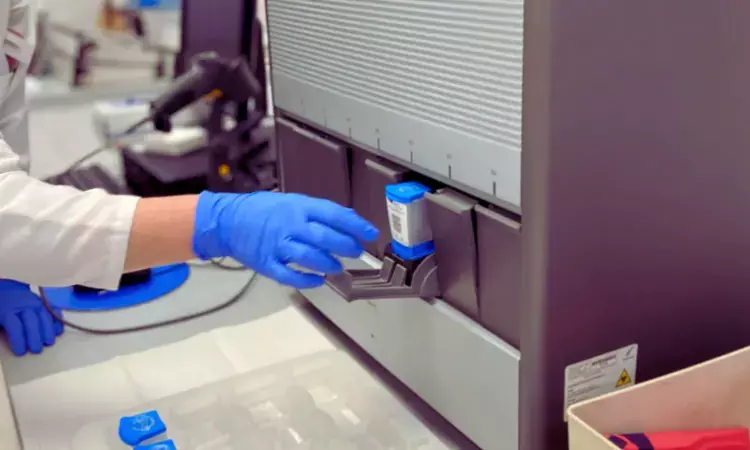- Home
- Medical news & Guidelines
- Anesthesiology
- Cardiology and CTVS
- Critical Care
- Dentistry
- Dermatology
- Diabetes and Endocrinology
- ENT
- Gastroenterology
- Medicine
- Nephrology
- Neurology
- Obstretics-Gynaecology
- Oncology
- Ophthalmology
- Orthopaedics
- Pediatrics-Neonatology
- Psychiatry
- Pulmonology
- Radiology
- Surgery
- Urology
- Laboratory Medicine
- Diet
- Nursing
- Paramedical
- Physiotherapy
- Health news
- Fact Check
- Bone Health Fact Check
- Brain Health Fact Check
- Cancer Related Fact Check
- Child Care Fact Check
- Dental and oral health fact check
- Diabetes and metabolic health fact check
- Diet and Nutrition Fact Check
- Eye and ENT Care Fact Check
- Fitness fact check
- Gut health fact check
- Heart health fact check
- Kidney health fact check
- Medical education fact check
- Men's health fact check
- Respiratory fact check
- Skin and hair care fact check
- Vaccine and Immunization fact check
- Women's health fact check
- AYUSH
- State News
- Andaman and Nicobar Islands
- Andhra Pradesh
- Arunachal Pradesh
- Assam
- Bihar
- Chandigarh
- Chattisgarh
- Dadra and Nagar Haveli
- Daman and Diu
- Delhi
- Goa
- Gujarat
- Haryana
- Himachal Pradesh
- Jammu & Kashmir
- Jharkhand
- Karnataka
- Kerala
- Ladakh
- Lakshadweep
- Madhya Pradesh
- Maharashtra
- Manipur
- Meghalaya
- Mizoram
- Nagaland
- Odisha
- Puducherry
- Punjab
- Rajasthan
- Sikkim
- Tamil Nadu
- Telangana
- Tripura
- Uttar Pradesh
- Uttrakhand
- West Bengal
- Medical Education
- Industry
Xpert MTB/RIF Assay Outperforms Traditional Methods in Detecting TB in High-Incidence Coastal Region: Study

China: In a recent study conducted in a coastal city with a high incidence of tuberculosis (TB), the Xpert MTB/RIF assay exhibited the highest TB detection rate at 66.8%, outperforming smear microscopy (40%) and culture (56%).
"It identified TB in 98.3% of cases with positive smear and culture results, 85.1% in cases with only one positive result, and 29.4% in cases where both smear and culture were negative. Additionally, Xpert demonstrated high accuracy in detecting rifampicin resistance, showing strong concordance with drug sensitivity testing," the researchers reported in BMC Infectious Diseases.
Traditional diagnostic methods for tuberculosis, such as sputum smear microscopy and culture, have limitations in sensitivity and time efficiency, with smear microscopy often missing cases with low bacterial load and culture methods being time-consuming and requiring specialized facilities, making them less accessible in resource-limited settings. Tuberculosis remains a global health challenge, particularly in diagnosing and treating smear- or culture-negative TB patients. The Xpert MTB/RIF (Xpert) assay, a novel molecular diagnostic tool, offers rapid detection of TB, although there is limited data on its performance in specific patient subgroups.
Against the above background, Ying Chen, School of Medical Technology, Xuzhou Medical University, Xuzhou, China, and colleagues aimed to assess the diagnostic value of the Xpert method in patients with varying smear and culture results and to evaluate its effectiveness in detecting rifampicin resistance (RR).
For this purpose, the researchers retrospectively gathered data from 1,721 patients clinically diagnosed with tuberculosis. Smear, Xpert, and traditional solid culture methods were employed to detect TB infection and evaluate the detection rate of Xpert based on different smear and culture result groupings. Additionally, information on rifampicin resistance detected by the Xpert method and the proportional method of drug sensitivity testing (DST) was recorded. Kappa values, sensitivity, and specificity were calculated to assess the accuracy of the methods.
The study led to the following findings:
- Among the three methods, the Xpert method had the highest detection rate at 66.8%, followed by the culture method at 56.0%, and the smear method with the lowest at 40.0%.
- The detection rate of Xpert was 98.3% when both smear and culture were positive.
- The detection rate of Xpert was 85.1% when only one of the two methods (smear or culture) was positive.
- The detection rate of Xpert was 29.4% when both smear and culture were negative.
- The Xpert method and drug sensitivity testing (DST) showed a high agreement (κ = 0.92) for rifampicin resistance (RR) detection.
- The highest mutation rate was observed for probe E (64.7%), while the least number of mutations occurred in probe C (1.5%).
The findings showed that the Xpert method demonstrates strong diagnostic value in detecting Mycobacterium tuberculosis (MTB) and rifampicin resistance, proving particularly effective in cases where traditional culture and sputum smear tests yield negative results. This capability enhances early diagnosis and treatment initiation for tuberculosis, even before traditional culture and drug susceptibility testing results are available.
"However, we recommend caution when interpreting positive Xpert assay results, as a comprehensive approach combining multiple test outcomes and clinical evaluations is essential for confirming the patient's final diagnosis and treatment plan," the researchers concluded.
Reference:
Feng, G., Jiang, H. & Chen, Y. Efficacy of Xpert MTB/RIF assay in detecting Mycobacterium tuberculosis in samples with different results by smear and culture in a coastal city with high incidence of tuberculosis. BMC Infect Dis 25, 55 (2025). https://doi.org/10.1186/s12879-025-10446-z
Dr Kamal Kant Kohli-MBBS, DTCD- a chest specialist with more than 30 years of practice and a flair for writing clinical articles, Dr Kamal Kant Kohli joined Medical Dialogues as a Chief Editor of Medical News. Besides writing articles, as an editor, he proofreads and verifies all the medical content published on Medical Dialogues including those coming from journals, studies,medical conferences,guidelines etc. Email: drkohli@medicaldialogues.in. Contact no. 011-43720751


